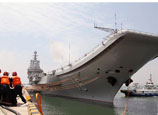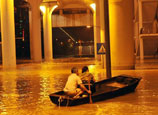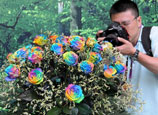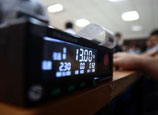
 |
| People watch the launch of Shenzhou X at Jiuquan Satellite Launch Center in Gansu province on Tuesday. ZOU HONG / CHINA DAILY |
Astronauts will tuck into sticky rice dumplings, but also face new risks
The three astronauts on board Shenzhou X have increased food choices and a more relaxed work schedule, but may also face new risks.
Nie Haisheng, Zhang Xiaoguang and Wang Yaping will celebrate Dragon Boat Festival on Wednesday with the traditional sticky rice dumplings known as "zongzi".
Zhang said the leaf-wrapped dumplings are just one of the new menu items, which include yogurt, rice porridge and dried fruits.
There is also shrimp, fish, and classic Chinese dishes such as fish-flavored pork slices and Kung Pao chicken, all sealed in silver gray packages.
Media reports also suggest astronauts can drink tea on this space trip, including iced black and green teas.
Besides food treats, manned space program spokeswoman Wu Ping said the astronauts will optimize operational procedures and should have more time to rest.
The astronauts who are set to live in the Tiangong-1 space module for more than 10 days will, however, face risks their predecessors never encountered.
Wu said Tiangong 1 has been in orbit for about 620 days and some components on the space module may not be optimal.
Tiangong 1, meaning "heavenly palace", is designed to function optimally for two years, which is just three months away, and it has experienced four docking tests, Wu said.
Some experts are also concerned about the safety of the space module's environment.
Despite an air purifier cleaning the module's air and astronauts on previous missions wiping away dust with wet tissues before leaving, there could be unknown risks, said Wang Xiang, chief commander of the space lab system.
"Astronauts lived in Tiangong 1 last year, bringing moisture inside. All the windows and doors were shut over the past year. We are worried about the microbes that may have grown inside the module and the hazards that microbes pose to the astronauts' health."
Even so, Wang added, the problem is a common one. Mold was found on surfaces aboard the Mir Space Station and the International Space Station. The most serious outcome was that fungus grew in cosmonauts' ears during a mission on the former Soviet Union's Salyut Space Station.
A published research document by US researchers indicates there are potential health threats from molds, including infections, plus toxic and allergic reactions such as asthma.
Although most molds are not a threat to humans with a healthy immune system, numerous studies have shown that the immune systems of many astronauts were affected as a result of space flight and habitation, the research report said.
Wang Xiang said that mold also presents a threat to space module components.
"It is a subject we will keep studying till China builds its own space station," he said.
 |



















![]()
